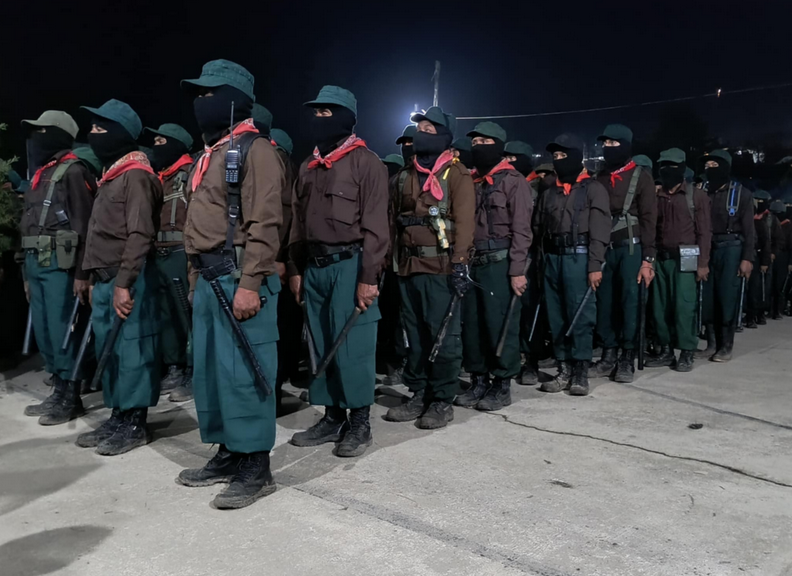
The recent encounter convened by the EZLN, the International Encounter of Resistance and Rebellion, allowed us to learn more in depth and with greater detail the proposal of the commons, which they had already advanced a year ago. For those of us who could not attend the meeting, it was important to hear from the commanders of the Clandestine Revolutionary Indigenous Committee (CCRI) and various authorities from assemblies of collectives of autonomous Zapatista governments, as well as Sub-commander Moisés explaining the genealogy of the Zapatista commons.
In the same meeting, they very clearly reaffirmed their rejection of war. We do not want the war that the capitalist system is waging, said Moisés, and he emphasized what they are building in the Zapatista territories. The phrase the capitalist system will not force us to wage war not only shows the rejection of following the system’s agenda, but also shows that they have their own calendar from which they will not deviate.
I would like to go deeper into one aspect of the commons. I do not intend to explain what it is about, since a good part of the meeting revolved around it, and I believe that the explanations given make any precision unnecessary.
The issue that seems relevant to me is that Zapatismo proposes something so radical and so profound, so contrary to what movements do, that it positively surprises and induces some reflections.
It is evident that the anti-systemic, anti-capitalist and emancipatory field is going through a dark period, of wars, catastrophes and repression. It is one of the worst times for the struggles from below, since no fundamental changes are seen on the horizon, but rather more storms. In times like the present, the usual thing is the more or less orderly retreat of the rebel forces.
In Latin America we have seen that when the right has advanced at gunpoint, the revolutionaries retreat, abandoning the struggle, entering into peace negotiations and limiting themselves to venturing only in those fields accepted by those above, such as the electoral game in which nothing important is decided. Those who had already focused on the legal/electoral, turn more and more to the right, maintain an apparently left-wing discourse but make the policy that suits capital, that is, they contribute to the dispossession.
Some of this happened with the Central American and Colombian guerrillas, but also with the progressives. That is why the current panorama is so bleak, to the point that the majority of the movements limit themselves to supporting the progressive governments and parties.
The EZLN, on the contrary, does not retreat, does not abandon its principles or enter into the system’s game. Far from that, despite having everything against it, it is taking an enormous step forward by promoting the commons, not as a horizon, but as a living and concrete practice in the territories where the support bases live and resist. At the moment of greatest darkness, when the immense majority has lost all hope, they launch a phenomenal challenge, overcoming not only private property, but also communal property, that is, all idea of property.
How is it possible for a political force to launch a deep offensive, just when the greatest advance of the system is being recorded? At first glance, it seems like a contradiction. However, it is about ethical and political coherence. Just as women who fight do not leave their liberation for a tomorrow that may or may not come, the Zapatistas do not wait for the Revolution to overcome capitalism, proposing the commons as a way out of this difficult situation.
It is ethics that led them to dissolve structures such as the good government councils, despite the fact that they were their own creation, because they came to the conclusion that they were no longer useful for fulfilling the objectives set. They could settle for the new world they are building, with clinics, schools, hospitals and other spaces. However, they are preparing to face the storm by deepening what they already are: rebels who resist capitalism while building the new.
If to withstand the storm it was necessary to cut down the damned pyramid, as Moisés said a year ago, to continue building the new it seemed necessary to begin working on the commons. I think it is a profoundly revolutionary proposal and reality, of a magnitude that we cannot yet measure, because there is nothing similar in the revolutionary movements known throughout history.
With this proposal, Zapatismo continues its process of transforming itself, of continuing with the changes, an endless process, as indicated by the story of old Antonio that the struggle is like a circle, that begins in one place but never ends. I think that over the years we will value the common as a profound anti-capitalist turn, as the beginning of a new long-term construction based on previous creations.
Original article by Raúl Zibechi, La Jornada, January 10th, 2025.
Translated by Schools for Chiapas.